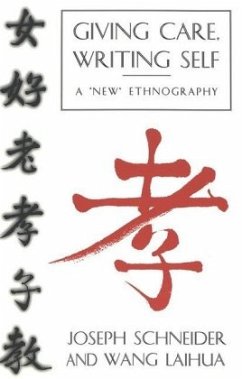The authors of this unconventional social science text draw on the division and difference in late-twentieth-century human science to write a critical, reflexive ethnography. The book's substantive focus is, simultaneously, the caregiving work and subjectivities that can develop around an ill parent living at home in urban North China at the end of the century, as well as a recurrent decentering of the authoritative, ethnographic voice and vision that would produce a conventional, centered narrative of these caregiving and subjectivity-producing practices and spaces. Schneider and Wang seek to write themselves into this text, both as would-be but skeptical filial sons, and as sociologists who are variously disloyal to the scientific traditions that they would use to ground their own personal/professional selves.
Bitte wählen Sie Ihr Anliegen aus.
Rechnungen
Retourenschein anfordern
Bestellstatus
Storno

